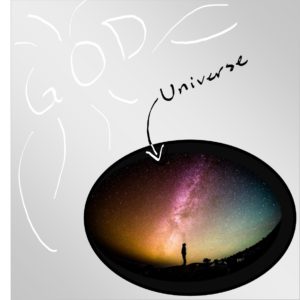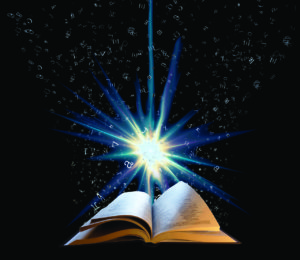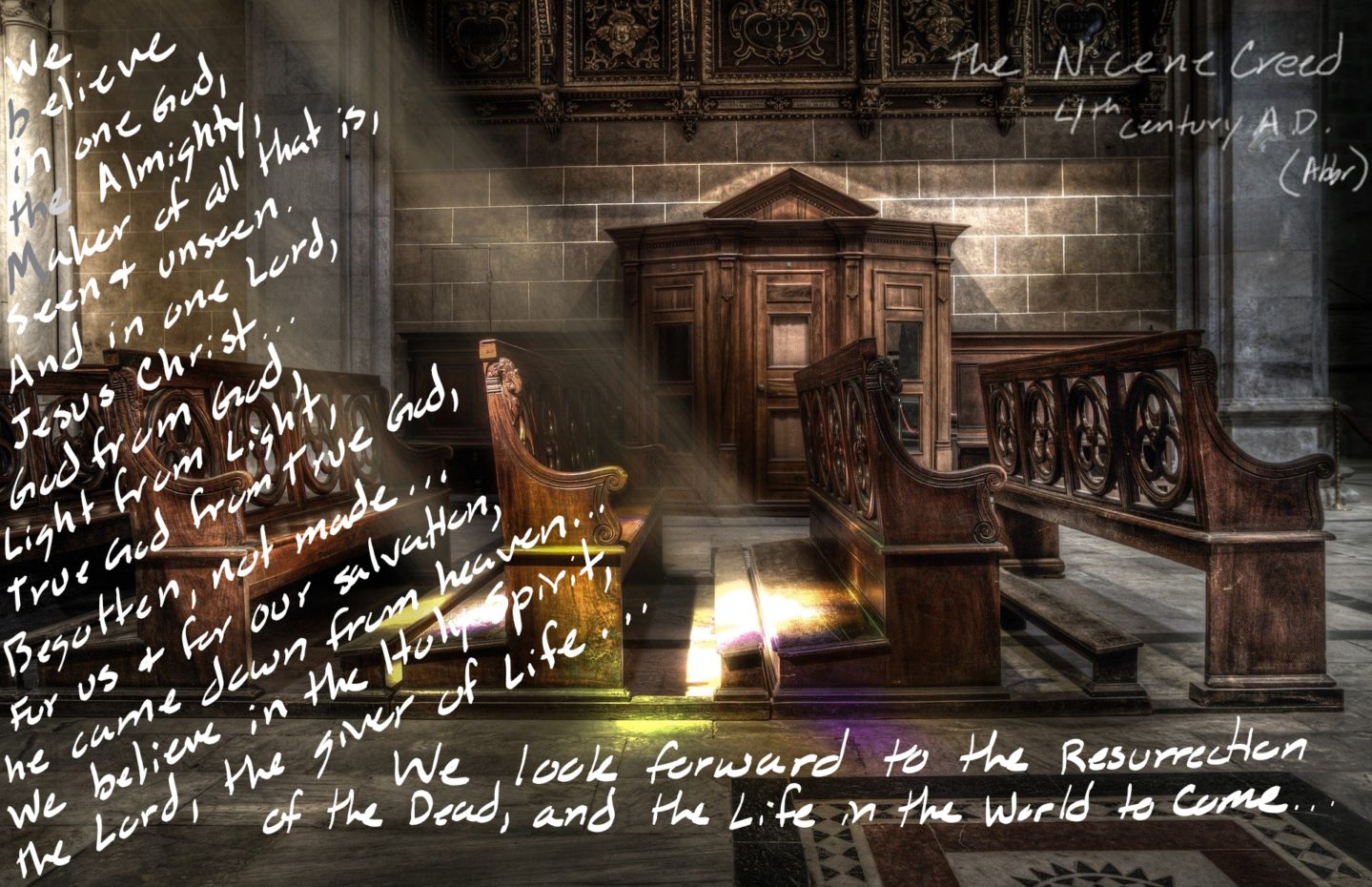The following statement has developed during my lifetime in the church, my exposure to several different Christian traditions, my undergraduate study of history, my four years spent presuing two Masters Degrees in the History of Theology and Christian Education, and many, many years of independent research. In other words, it did not come to me over night.
After thrity-two years of careful examination, refection, and soul searching, this is what I believe:
The Foundation
I Believe in One God, the only Uncreated Being. This God is the Creator of all reality, redeemer, constantly sustaining all that exists, eternally existant in Three Persons, so called Father, Son, and Holy Spirit. Together, the Three Persons have and do reveal Godself to and participate in history and in human existence, in many and various ways, to do the work of creating, redeeming, and sustaining.
This is a summary of Christian doctrine regarding the being of God.
Existence
I believe that God is the source of all existence, seen or unseen, spirit, soul, and body, matter, energy,  and any other form of existence that science may have yet to discover.
and any other form of existence that science may have yet to discover.
In others words, and in terms as simple as possible, God is Life/Existence, anything else is Death/Non-existence.
At the beginning of what we know as time or the universe or reality, God shared God’s life or existence with non-existence. The result was reality as we humans know it, also and more simply called Creation.
The universe as we known it is, therefore, a composite of life and death, existence and non-existence. We know this combination as “mortality.”
Eternal Vs. Mortal
 I Believe that God, the only Uncreated Being with neither beginning nor end, exists eternally outside of time and space (that is, outside of reality as we know it).
I Believe that God, the only Uncreated Being with neither beginning nor end, exists eternally outside of time and space (that is, outside of reality as we know it).
I believe that we humans exist inside of a time-bound, constantly decaying, created universe.
In other words, while God exists outside, in the Eternal Realm, humanity exists contained inside a Mortal Realm.
By God’s grace, the Eternal and the Mortal Realms can touch each other, but they cannot (or should not be able to) cross into each other.
Therefore, human reality (the cosmos or creation), including but not limited to the human mind, cannot and never will fully comprehen or understand what God is or how God operates.
In other words, the universe itself is too small to hold even the concept of God’s existence, let alone God’s existence itself. Or, as Paul put it in 1 Corinthians 13:12: “Now I see in a mirror dimly…” All that we humans can ever know about God is only a dim reflection of God’s true existence beyond the limitations of our reality.
The Unique Event
I believe that, despite our shortcomings in the Created Realm, “God so loved the world…” (John 3:16) that God left behind the glory and perfection of God’s Eternal Realm to be born, to live, and to die as a human being named Jesus.
 This is the unique event of Christian faith which exists in no other religious tradition.
This is the unique event of Christian faith which exists in no other religious tradition.
Only in Christianity does the All Powerful Creator beyond time choose to bind and subject himself to time out of love for the creatures (humans, and perhaps etc.) bound and subjected to time. Only in Christianity does the Eternal choose to become Mortal.
Why the Unique Event?
Christianity answers this question in several different ways, and no explanation is complete in itself. However, at it’s most basic:
I believe that God is born into the Mortal Realm in order to lead the Mortal Realm into the Eternal Realm, through faith. This faith is the imitation of Christ through holy living which includes the intentional effort to create a better world here and now.
Apocalypse
I believe that God is and always has been in the process or bringing the Mortal Realm into the Eternal Realm.
The Mortal Realm will one day end because it is Mortal, and therefore, by definition, it has a beginning and an end. But God’s intention in the creation of our Mortal Realm is, and always has been, to bring the Mortal Realm into the Eternal Realm at its ending.
This is called the apocalypse – a Greek word that means revelation, or Unveling – when mortality will become eternal, and creation will come to live face-to-face with our Creator. It involves the total destruction of the universe as it now is, purging all the weakness and evil now present in this universe, in order for a stronger version of this universe to be reborn into Eternity.
Scripture
“God, who also made us sufficient as ministers of the new covenant, not of the letter but of the Spirit; for the letter kills, but the Spirit gives life.”
~2 Cor. 3:6
 I believe that Scripture is exactly what Scripture itself claims to be, an inspired tool “useful for doctrine, for reproof, for correction, for instruction in righteousness,” (2 Tim. 3:16).
I believe that Scripture is exactly what Scripture itself claims to be, an inspired tool “useful for doctrine, for reproof, for correction, for instruction in righteousness,” (2 Tim. 3:16).
I believe in progressive revelation, NOT that God’s word or message changes with time, but that our ability, as human beings, to understand God’s message changes, grows, and improves with time and with the acumulation of knowledge – which is itself from God.
Scripture is the work of human beings writing in their own unique times and places under divine inspiration. The words of Scripture are, therefore, neither absolute nor inerrant. The messages contained in Scripture, however – what Paul calls its “spirit” (2 Cor. 3:6) – come to us from God, and are absolute, Eternal, and True. Because of the limitation of human knowledge, it is the job of each generation to interpret, understand, and move forward the eternal messages that God has given us.
I am nihilist because…
…I agree with the writer of Ecclesiastes that “everything is vanity,” (Eccl. many times, including 1:2) The Hebrew word habel, translated “vanity” is also translated “meaningless.”
There are different forms of nihilism, so to be accurate, I am an existential nihilist, believing that human existence is without meaning, random, beyond the control of our free will – if free will even exists – and ultimately pointless.
Ecclesiastes is the book of the bible that resonates most deeply with me, and it is a nihilist document, probably one of the first nihilist documents ever written. It is 12 chapters expounding about the tragic brevity and pointless of human existence, and the absolute uselessness of all human effort. All humans, wise or foolish, rich or poor, powerful or weak, good or bad, ultimately die are are forgotten. Anything they do manage to achieve in their brief lives does not last long after their deaths.
I am postmodern because…
…I believe in progressive revalation, the accumulation of knowledge, and the human inability to ever fully comprehend God.
Along with postmodern thinkers, I believe that Absolute Truth is un-knowlable. We are all the products of our environments, socially programmed to believe certain things, and reluctant to challenge those assumptions. Because we are products of our environment, and of our genetics, most of the decisions we will make are predetermined by forces beyond our control.
God exists beyond the limitations of time and space. God is Absolute Truth. Just as we humans are not capable of comprehending God, we are not capable of comprehending Absolute Truth, let alone controlling that Truth.
There will, in other words, always be things beyond our knowledge, and beyond our control.
I am Christian because…
… I believe in God, and in the Unique Event. Moreover, I believe that the Unique Event defines and explains the relationship between the Eternal and Mortal Realms in a way that no other theory can.
… I believe, along with the writer of Ecclesiastes, that the fact of nihilism ultimately gives way to the fact of God (Eccl. 12:13) and God’s continuing war against nihilism (1 Cor. 15:54). In other words, human existence is pointless – God gives that pointlessness a point, an ending, which is the Apocalypse.
… I believe tha t Absolute Truth does exist, beyond our human ability to comprehend it, outside of time and space, in Eternity. It is the limitation of the Mortal Realm that makes human existence pointless, random, and beyond the influence of free will. It is the grace of God that brings order to the randomness, and gives power to free will. We can never fully understand God or God’s plan, but by God’s grace, we can still enact our part in that plan, here and now.
t Absolute Truth does exist, beyond our human ability to comprehend it, outside of time and space, in Eternity. It is the limitation of the Mortal Realm that makes human existence pointless, random, and beyond the influence of free will. It is the grace of God that brings order to the randomness, and gives power to free will. We can never fully understand God or God’s plan, but by God’s grace, we can still enact our part in that plan, here and now.
… I believe that we have one real choice to make in life: To participate in the movement of the Mortal Realm into the Eternal Realm, or not.
In other words, our one, God-given choice is to help God make a better world, or to accept the world as it is.

What is the most natural normal reading of Genesis 1:1? And what value does that reading have?
Genesis 1:1 is simple enough. But some think it *explicitly* means only that ‘In the beginning, God created time, space and matter’. That suggests nothing of any relation which this ‘God’ has to us. For, the only things it requires of the reader is to have some notion of time, space and matter. Not so for the most natural normal reading of the verse. But, are we not born with, and grow up in increasing in, a natural knowledge of so much more? Indeed, we do.
Again, the ‘cosmic physics’ view requires of the reader only to know of time, space and matter. So it is more fitting for the first statement for an account about Deism than for Genesis 1:1. This view is metaphysically and informationally miserly. It doles out the least possible, and most reductive, information on origins.
Don’t get me wrong. I am not denying that the Biblical Creator created time, space and matter. Natural Theology demands that He did. What I am saying is that, in order for Genesis 1:1 to be true to that fact, none of its *explicit* level of information need be spent on that fact.
The ‘cosmic physics’ hermeneutic on any part of Genesis 1 is more in keeping with a ‘spaceship cosmology’ than with an Earth-affirming cosmology. A ‘spaceship cosmology’ is one that lacks any natural knowledge of an Earth-based way of life. Instead, it has only a sense of things that can be naturally known if we were all born inside a ‘glorious’ Star Trek style spaceship.
This is a scenario in which this ship not only does not need, but does not have, anything from a planetary ecology, whether open air, open water, plants and animals, a water-cycle, natural gravity, the Sun, etc.. What this ship has is all the concerns for maintaining the ship’s systems of life support: gravity generators, outer bulkhead integrity, good air, air pressure, heating, lighting, the food synthesizer, etc.. And its lighting and heating systems are mutually independent from one another: its heating producing none the kinds of radiation by which humans see; and its lighting producing little or no heat. And, for some of these systems, we could not afford for them to break down, which means we could often face having no days off in maintaining them, or no days off in fixing them if they break down.
Here, below, is what I think is a far more meaningful relation to be found in the most natural normal reading of Genesis 1:1.
1. The general, (or ‘masculine’) cosmos and the special (or ‘feminine’) Earth (Genesis 1:1).
2. The Earth, as its own general subject, implying that which we all intuit is most valuable about the Earth unto itself in all the cosmos: its abiding maximal abundance of open liquid water (Genesis 1:2).
3. that water and its special relation to the Sun’s light, hence the water cycle (vs. 3-10);
4. The water cycle and its special beneficiary and member, biology (vs. 11-12);
5. biology and its special category, animal biology (plant/animal/mineral = animal) (vs. 20-22, 24-25);
6. Animal biology and its special category, human (vs. 26-28);
7. The general man and the special woman (Genesis 2:21-23).
Some people may be displeased with all this. They may say that all this is unnecessarily complicated. This displeasure is understandable, and often fairly justified. The problem is when even some of those people become ‘inspired’ to think that v. 1 explicitly only that God created time, space and matter.
The point in all this is that, if Genesis 1 is made up only of plain, and plainly natural, statements, then not only does it not have any unnatural hidden nuances, it does have a lot of very good natural implications. Plain statements necessarily have the later, and none have the former. But a dissociative way of mind both (a) mistakes the latter for the former and (b) fails to see much of the latter.
The common criticism of Creationists against those who read the first chapters of Genesis “metaphorically” is that we are not reading these chapters in the “most straightforward” way “as they were meant to be read.” Instead, we’re interpreting, extrapolating, inserting our own symbolic meanings because (for some bizarre reason) we just can’t stand the idea that this is all historical…
What the criticism misses is the very basic fact that the “most straightforward” reading of a metaphorical text is, indeed, the metaphorical reading. And yes, you are correct, the pure historical reading of these chapters misses almost every single one of the many, many, gorgeous and profoundly meaningful metaphors contained within them.